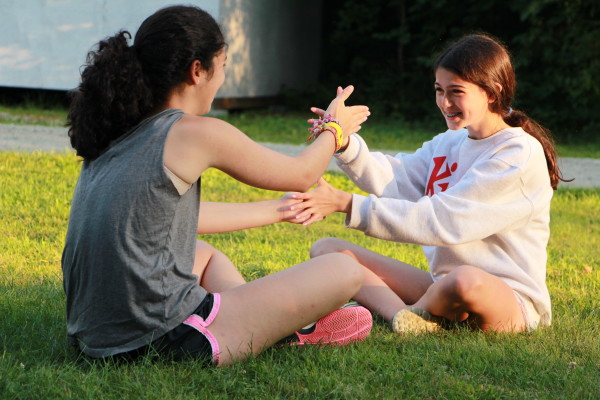21st Century Skills and Summer Camp
My Snapchat Ate My Homework and My Ability to Think for Myself: Navigating the Digital Age and How Summer Camp Can Help
by Margaret Stockard
“Connection is a kind of degraded conversation. You’re sitting with a bunch of friends at dinner. You’re talking but all six of you also have your phones out. You’re dividing your time between talking to each other and looking down at your phone. You keep the conversation light because you’re paying attention to what’s on your phone. What you have at that table isn’t conversation, it’s connection. It’s conversation minus the empathy and the commitment to putting yourself in the other person’s shoes.” – Dr. Sherry Turkle (Professor at MIT)
The year is 2016. Cars park themselves. Robots walk and talk and vacuum your floor. Drones take pictures at the family picnic. And little Sally knows how to simultaneously snapchat, tweet, and instagram a selfie and even how to study for the SATs, but ask her to stand in front of a group of people she doesn’t know and formulate a technology-free conversation or make her own bed or autonomously get herself out of a predicament….well, she struggles.
Technology is a drug and we are the drug pushers. And users. At school, children are sitting and listening or on their phones. There is no solitude. There is no place to become comfortable in their own skin. A recent study showed that college students would rather go through mild electric shocks than go without their phones. Put them in a room with nothing but themselves and a gonzo effect ensues. Now this article isn’t a stance against technology. There are many values that can come from it. Wine and coffee are apparently good in moderation. Or cake even. I would say that sometimes birthday cake is pretty vital. But if you ate cake every day for 10 hours straight…it’s safe to say that it would start to take a negative toll on your well-being.
In the Amazon, there are children living in tribes who at the age of 3 are cutting down grass and wood with machetes and are also preparing food over an open flame. Now pan over to North America and we see young people battling parents over carrying out modest household chores (and definitely not without being solicited to do so), talking about their day, or independently completing homework assignments. I’m not suggesting we all give our toddlers knives and set them off, but there is a unique juxtaposition between how these children are brought up. Parents are also concerned with their child’s achievement and success and feel that sometimes they need to step in to make sure certain things come to fruition.
“Most parents today were brought up in a culture that put a strong emphasis on being special…Being special takes hard work and can’t be trusted to children. Hence the exhausting cycle of constantly monitoring their work and performance, which in turn makes children feel less competent and confident, so that they need even more oversight.” – Madeline Levine

We want our children to succeed so at times we overstep. We want to keep the peace so we allow them to be overindulged. Kids are being over stimulated and the technology is, contrary to one’s intentions, not helping them self-regulate their emotions or practice emotions with someone else. They are becoming less able to handle challenging situations. You may help them with their science or math homework. They may be able to work an excel spreadsheet in an internship. But if they don’t know how to lead or be patient or flexible or independent, they will falter in today’s society.
Businesses today have labeled the following as some of the top skills they value and look for in a candidate:
• Teamwork
• Creativity
• Critical Thinking
• Problem Solving
• Flexibility
• Oral and Written Communication Skills
• Initiative
This is where school sometimes falls behind and where summer camp steps right up. At camp, children have a place to practice conversation, connection, solitude, autonomy, and organic play. Campers are able to choose activities based on their interests. They learn to navigate new friendships, learn new skills, adapt to a new environment, fully engage in the moment…all while being phone-free. Some campers take a bus by themselves and are dropped off at camp. They meet their bunkmates and counselors. They have room to imagine, to get dirty, to be flexible when a storm hits out of nowhere, and even to be bored. These facets are all part of a healthy mental life. Camp is a way to re-discover their imagination, at any age. The art of storytelling and letter writing is established. In turn, all of these skills listed above are skills which campers receive at summer camp. These skills are ones which will stay with them well beyond their time by the lake. They will stay with them beyond the standardized tests. Beyond the coffee runs and copy machine operations at that one internship they thought they just had to have to get a good job.
I once worked with a family who had a nine year-old boy who could not properly put his own belt on. And it was easier for everyone else to do it so they always did. I literally witnessed his mother kneeling down to put his belt on while he stood in the kitchen watching a YouTube video. He was part of every after school program. He was being told daily that he would grow up to be a famous actor. That he was special and wonderful and gifted and the best. And he was indeed special and wonderful and gifted, but not because of what they wanted him to become. And they were definitely holding him back from every being what he could become. He also never went to summer camp.
“There is a vitality, a life force, an energy, a quickening that is translated through you into action, and because there is only one of you in all of time, this expression is unique. And if you block it, it will never exist through any other medium and it will be lost. The world will not have it. It is not your business to determine how good it is nor how valuable nor how it compares with other expressions. It is your business to keep it yours clearly and directly, to keep the channel open.” – Martha Graham






 Check Out Our Two Week Camp Experience!
Check Out Our Two Week Camp Experience!